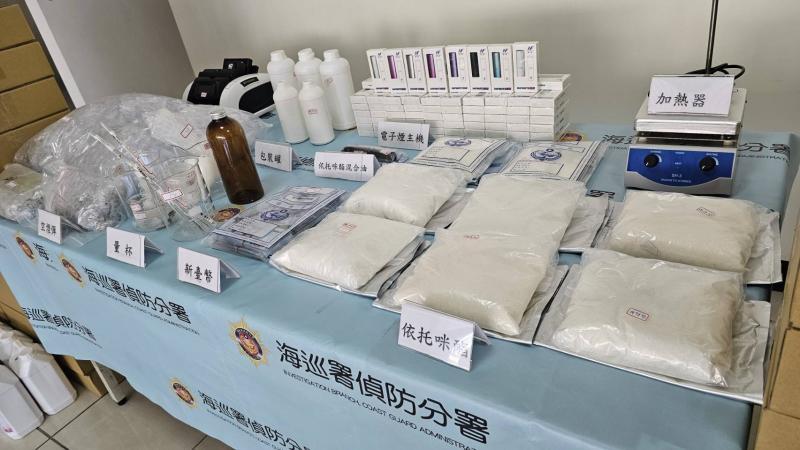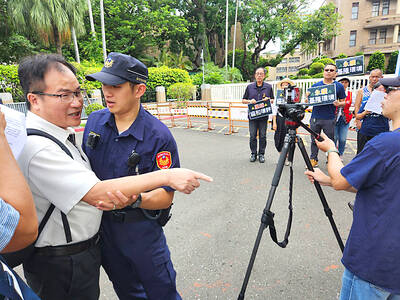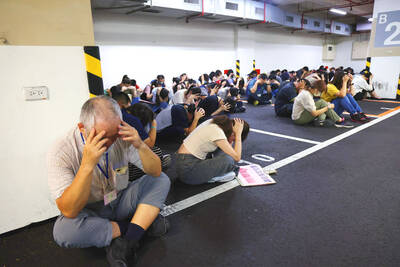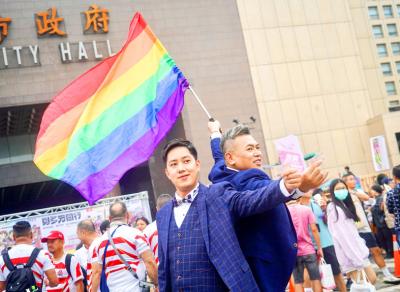The Executive Yuan today approved a Ministry of Justice narcotics review committee plan to reclassify etomidate, also known as the “zombie vape” drug, as a Category 2 narcotic to strengthen law enforcement efforts.
“Zombie vapes” use etomidate, a type of central nervous system depressant that can induce anesthesia.
In a news conference following the Cabinet meeting, Deputy Minister of Justice Huang Shih-chieh (黃世杰) said that simple possession of the drug would be a criminal offense.

Photo: Chiu Chun-fu, Taipei Times
Reclassification to Category 2 means increased penalties for manufacturing, trafficking, transporting and selling etomidate when compared to Category 3 drugs, Huang said.
This also means that possession or using it also qualifies as a crime, Huang added.
According to the Narcotics Hazard Prevention Act (毒品危害防制條例), those convicted of using Category 2 narcotics shall be punished with a maximum three-year fixed-term imprisonment.
Those convicted of possessing it shall be punished with a maximum two-year fixed-term imprisonment, detention or a fine of no more than NT$200,000 (US$6,142).
Offenders of manufacturing, transporting or selling Category 2 narcotics are subject to life imprisonment or a minimum 10-year fixed-term imprisonment, and may also be subject to a fine of no more than NT$15 million.
There have recently been several high-profile cases of the growing issue of “zombie vapes.”
On Sunday, a conscript was found in a military training center with 50 cartridges, and earlier this year, police officers were killed by drivers who were under the drug’s influence.
In related news, the Executive Yuan passed a new phase of its anti-drug strategy plan, which calls for the government to invest NT$15 billion on anti-drug enforcement efforts.
The funds would go toward reducing supply of new drugs such as etomidate, as well as limiting access to the chemicals needed to create them.
Part of the plan is to incorporate high-tech detection methods to crack down on Internet-based drug trafficking, with the strategy also calling for cross-border cooperation and intelligence sharing.
The Taiwan High Prosecutors' Office is integrating anti-drug resources into its six major enforcement agencies to ensure source tracking and cross-agency cooperation, he said.
For serious cases involving the drug, prosecutors would also push to seize the proceeds, he added.
Since etomidate is mostly consumed in vape form, authorities in the Ministry of Health and Welfare are coordinating with law enforcement to limit the spread of such devices under the Tobacco Hazards Prevention Act (菸害防制法).

Environmental groups yesterday filed an appeal with the Executive Yuan, seeking to revoke the environmental impact assessment (EIA) conditionally approved in February for the Hsieh-ho Power Plant’s planned fourth liquefied natural gas (LNG) receiving station off the coast of Keelung. The appeal was filed jointly by the Protect Waimushan Seashore Action Group, the Wild at Heart Legal Defense Association and the Keelung City Taiwan Head Cultural Association, which together held a news conference outside the Executive Yuan in Taipei. Explaining the reasons for the appeal, Wang Hsing-chih (王醒之) of the Protect Waimushan Seashore Action Group said that the EIA failed to address

Taipei on Thursday held urban resilience air raid drills, with residents in one of the exercises’ three “key verification zones” reporting little to no difference compared with previous years, despite government pledges of stricter enforcement. Formerly known as the Wanan exercise, the air raid drills, which concluded yesterday, are now part of the “Urban Resilience Exercise,” which also incorporates the Minan disaster prevention and rescue exercise. In Taipei, the designated key verification zones — where the government said more stringent measures would be enforced — were Songshan (松山), Zhongshan (中山) and Zhongzheng (中正) districts. Air raid sirens sounded at 1:30pm, signaling the

The number of people who reported a same-sex spouse on their income tax increased 1.5-fold from 2020 to 2023, while the overall proportion of taxpayers reporting a spouse decreased by 4.4 percent from 2014 to 2023, Ministry of Finance data showed yesterday. The number of people reporting a spouse on their income tax trended upward from 2014 to 2019, the Department of Statistics said. However, the number decreased in 2020 and 2021, likely due to a drop in marriages during the COVID-19 pandemic and the income of some households falling below the taxable threshold, it said. The number of spousal tax filings rebounded

A saleswoman, surnamed Chen (陳), earlier this month was handed an 18-month prison term for embezzling more than 2,000 pairs of shoes while working at a department store in Tainan. The Tainan District Court convicted Chen of embezzlement in a ruling on July 7, sentencing her to prison for illegally profiting NT$7.32 million (US$248,929) at the expense of her employer. Chen was also given the opportunity to reach a financial settlement, but she declined. Chen was responsible for the sales counter of Nike shoes at Tainan’s Shinkong Mitsukoshi Zhongshan branch, where she had been employed since October 2019. She had previously worked